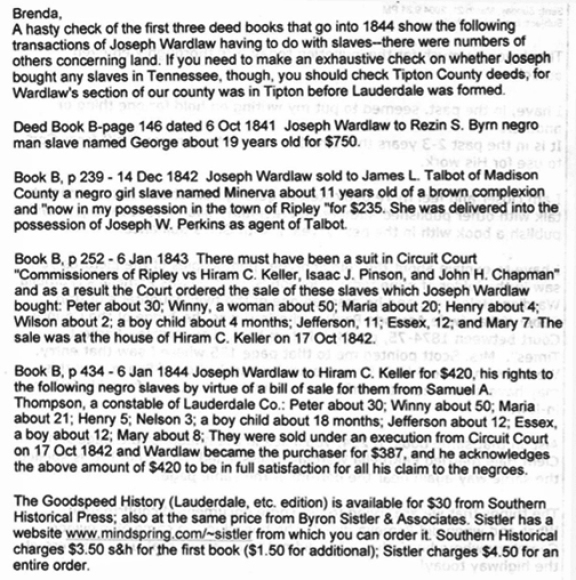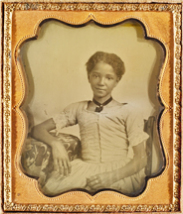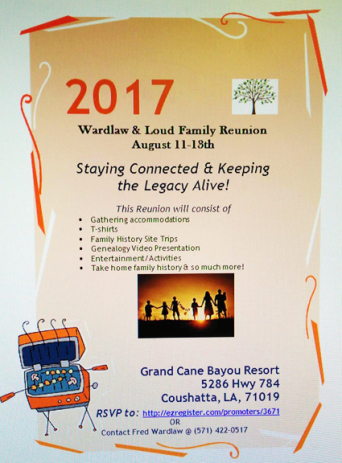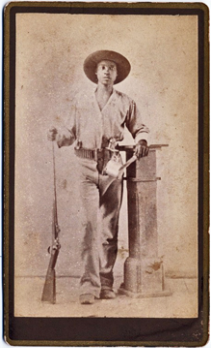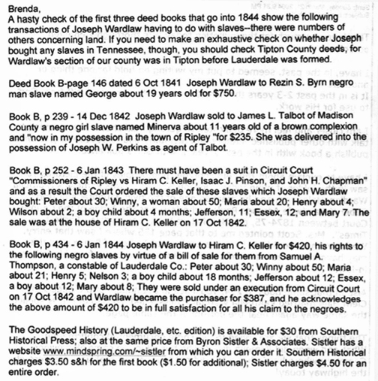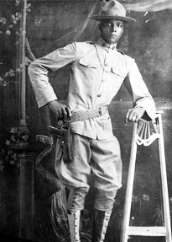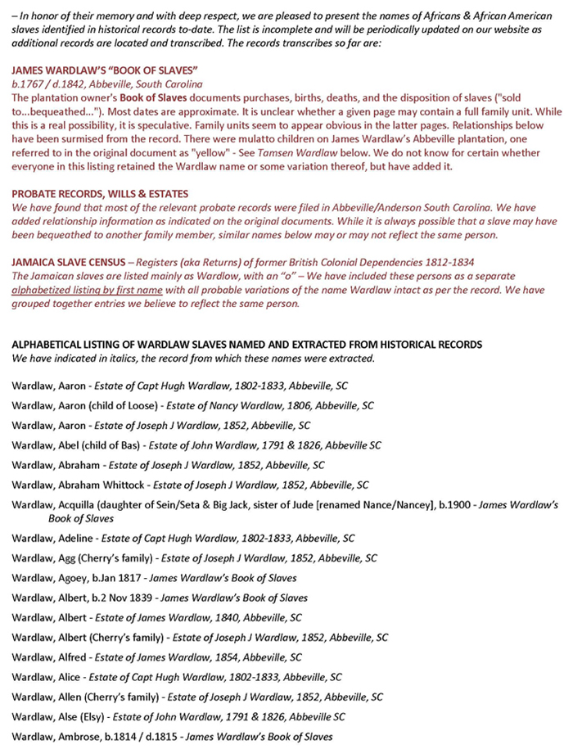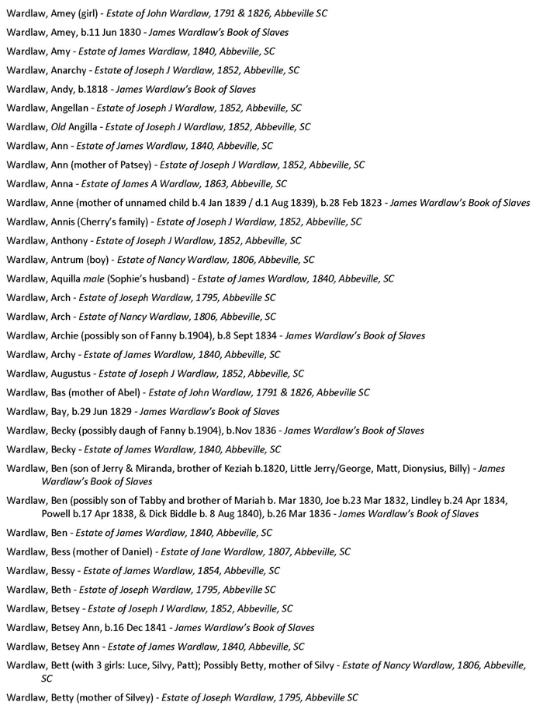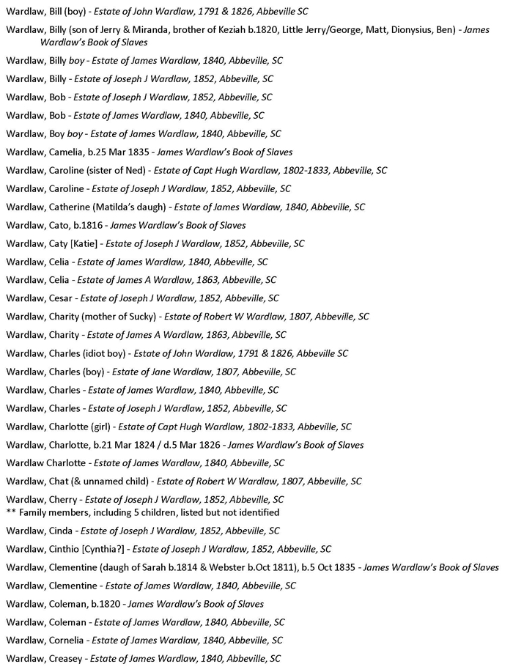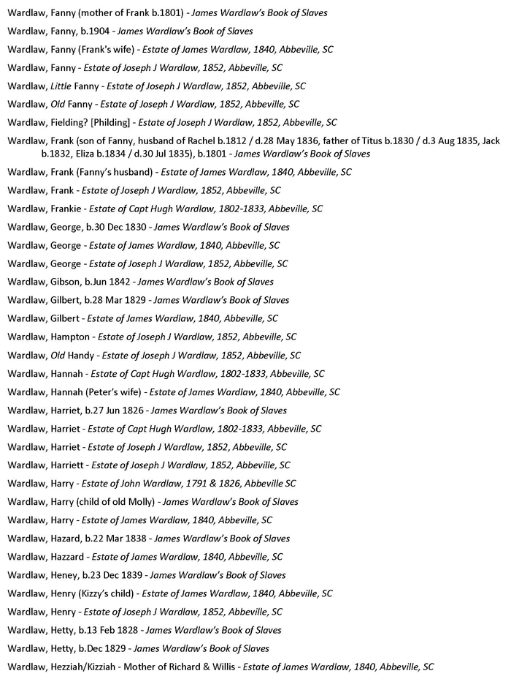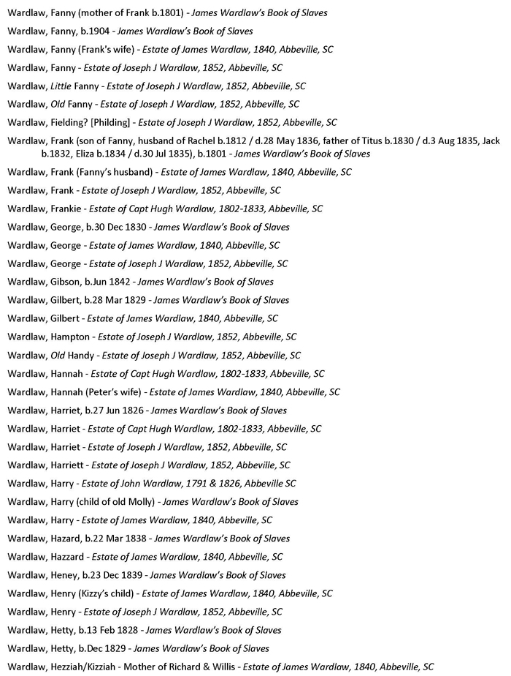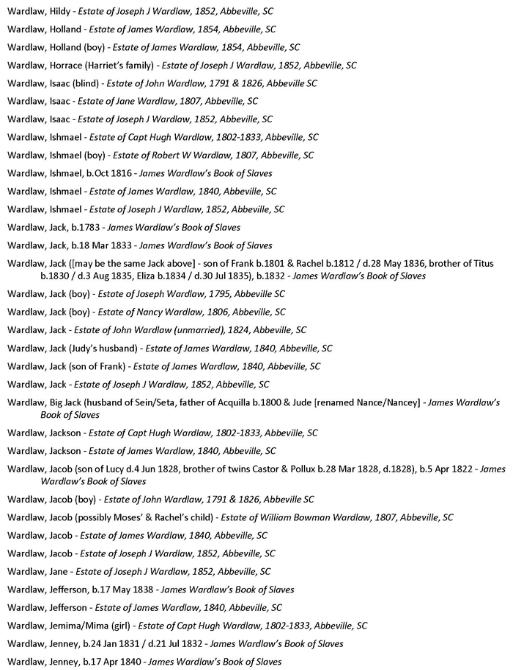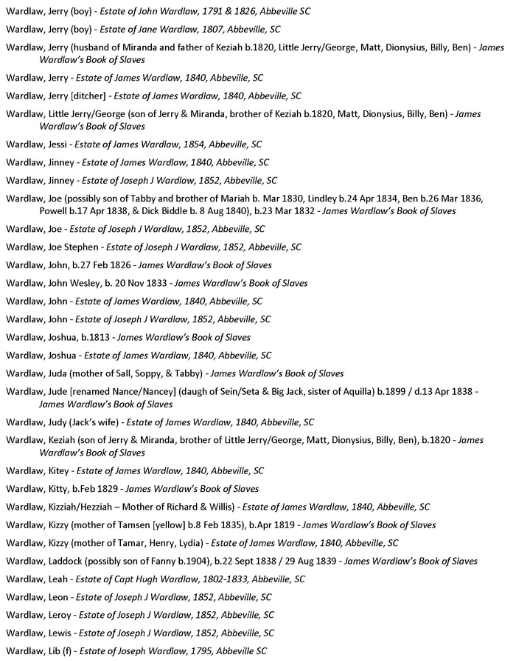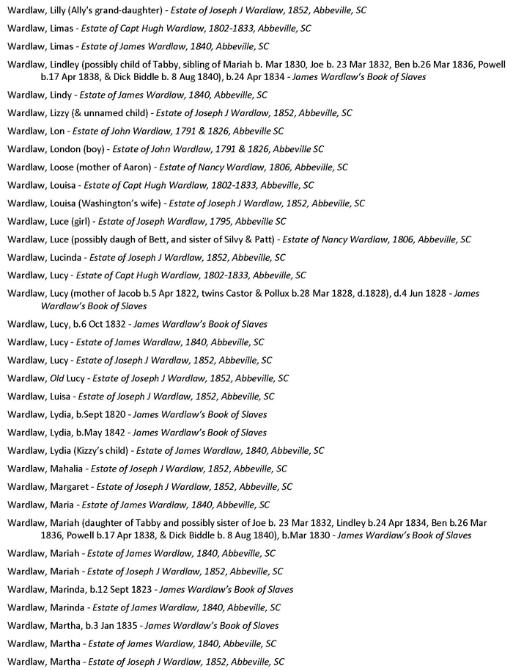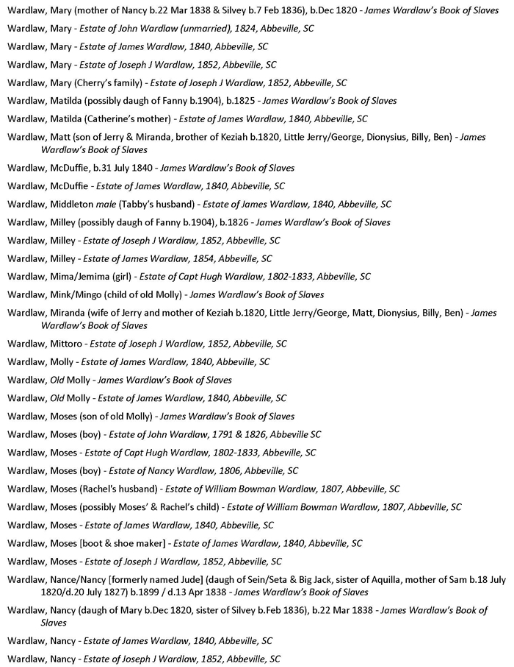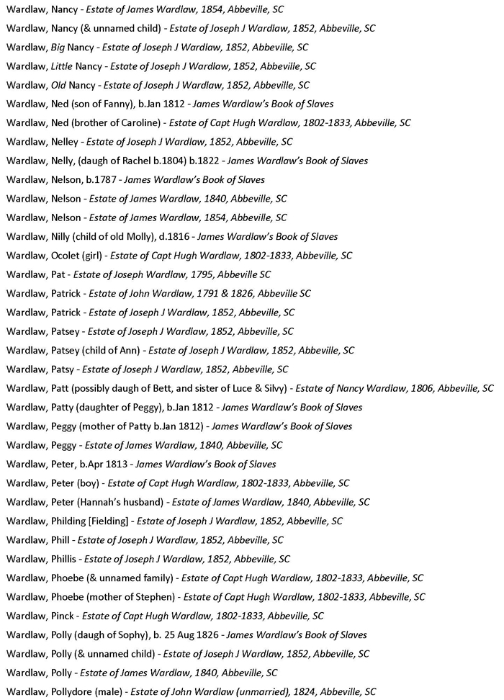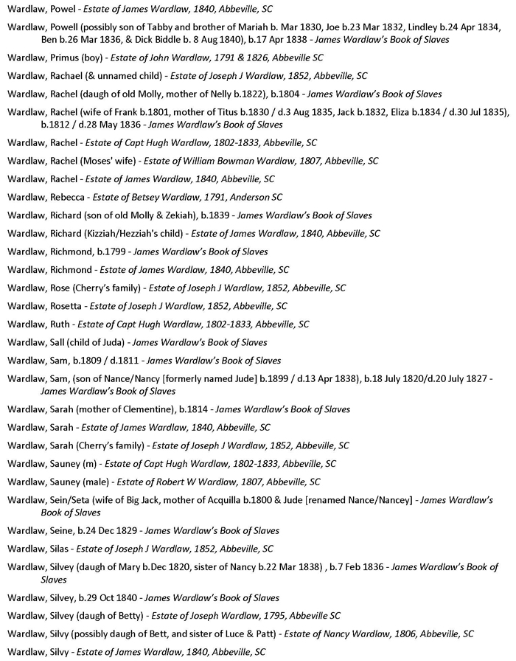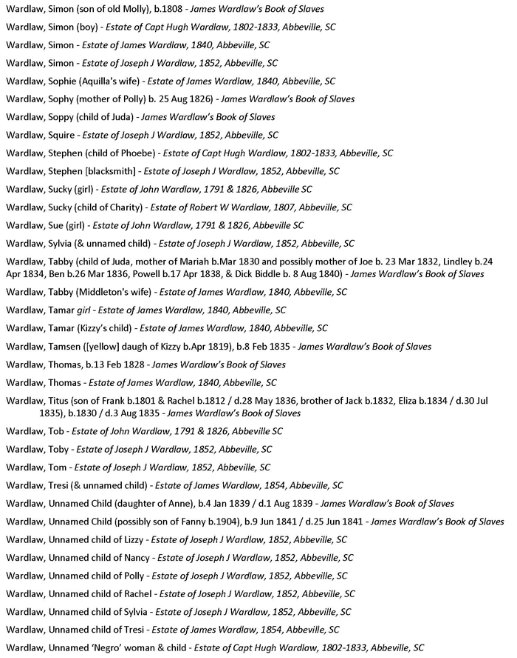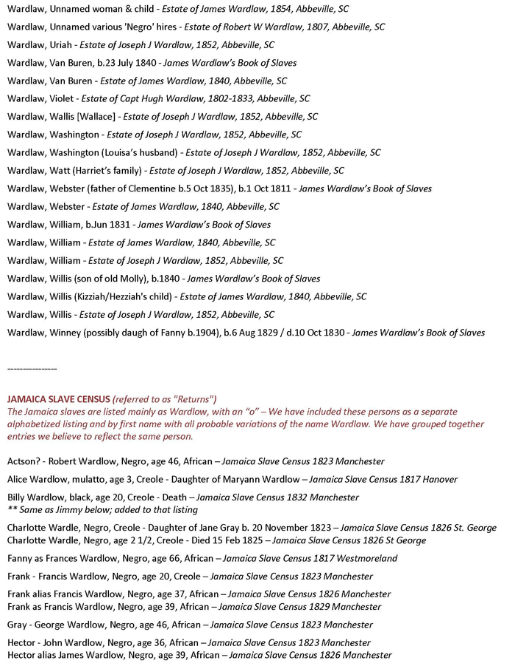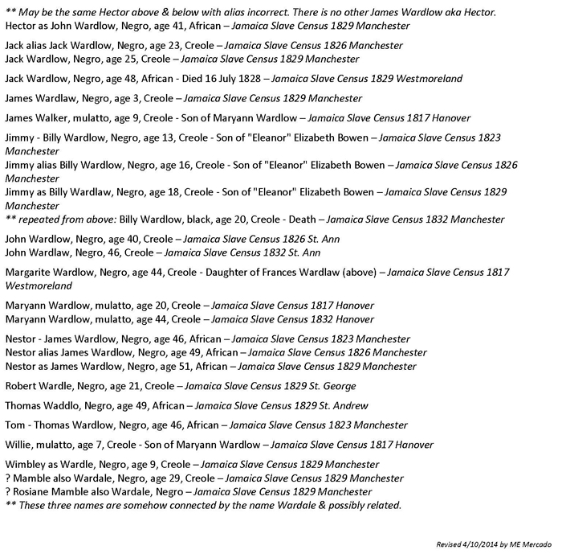Black Wardlaws
New Page and Project ~ 'Black Wardlaws'
<<< Please browse through the tabs located at the left of this page. To return to this page click on main 'Black Wardlaws' page above.
Please note: these pictures on these 'Black Wardlaws' pages are not anyone specific that we know, just pictures for illustration.
Diane
WE NOW HAVE HAD A WONDERFUL BREAKTHROUGH! WE HAVE LINKED A LINE TO THE WARDLAW SLAVE OWNERS, TRACING TWO SPECIFIC NAMES, A BROTHER AND SISTER, FROM OWNER TO OWNER, FREEDOM AND DOWN TO TODAY!! WE THANK THAT PERSON FOR CONTACTING US AND GIVING US THE INFORMATION TO MAKE THIS CONNECTION!!
We can work on your line too, just write and give us your information and we'll add it it to our tree. We also need you to help us work on this project! If anyone wants to have a hand in this, please write and let us know!
New information of slaves of Joseph (E91) Wardlaw of Tennessee - He had two slaves, Tom Wardlaw and Hillary Wardlaw (I believe were both males) that built the house 'Sugar Hill' for him. See Hillary Wardlaw in the tree 'Black Wardlaws'.
This page 'Black Wardlaws' and the projects we are working on are an effort to bring together the scattered information that we now have and combine it with what each one of you has to build a complete picture.The history of the slaves in America is sketchy at best and this is an attempt to find each family's origins when they were owned by the Wardlaws and took the name.
We are building a Tree on Ancestry.com to compile everyone's information to enable more people to search and find their links. This tree is called 'Black Wardlaws'. On it you will see many separate families. To look for any one name, go to the box in the top right corner that says 'find a person in this tree'. You will see the Index of names, along with their birth dates and place of birth if known. Click on any person and you'll see what is in their family tree. Or to see everyone, click on 'List of all people'. You will see on the tree there are census records, documents, pictures, gravestone pictures, cemetery pictures, and much more!! Please write us if you want to get into the tree, even if you don't have an Ancestry.com subscription, we'll send you a link to go to it.
We have linked many of the 'Hints' for these people in each person's 'Profile'. There are Census Records, and other hints to look at. We'd love to get some pictures! Do you have any?
Right now it has been up for a few months and already has 1,472 people in it. This is just a start, we'll be adding to this often. If you have information to add, please let us know and we can build up this tree.
Many of the early Wardlaws had slaves and these are the descendants of those people. We'll be gathering the documents, wills and other items that will be helpful and put them on here.
Thanking you in advance for your input and participation!
Write us:
dianewardlaw7@yahoo.com
and see the tree "Black
Wardlaws" at:
www.Ancestry.com
Maria Elena Mercado is now an
Editor on this tree and helping to organize the data. Below is what she has done and is sharing with us.
If any one of you want to add info to this tree, please write and tell us, we'll add in your data.
Update
Maria has made a great start on this project as you can see below. We need to continue this work on to include everyone we can find so there will be a
comprehensive index of names and dates, to avoid duplication and re-inventing the wheel.
A word from our co-editor
Our research indicates that there were a total of 7 generations (A-G) of Wardlaws potentially engaged in slavery, spanning 145 years from about 1720-1865 - Not all Wardlaws owned slaves. (See sub-head showing GENERATIONS)
We need to identify persons willing to take on the task of transcribing Wardlaw slave holdings per the 1790-1860 US Census Schedules for just their specific research region of interest. It's not a
huge task when broken down by state & county. All we need is one volunteer to complete this information for one county in one state of their interest. If everyone researching black
Wardlaw heritage would collaborate, we can compile the most complete picture of black Wardlaw ancestors, providing everyone with the best opportunity to positively identifying their
ancestors.
I'm sure others have already done exactly what I've spent hours doing - The duplication is insane! Once we have compiled all this information and it's all up on the site, it's a permanent record for
all Wardlaws. I cannot cover the entire USA - My eyes won't let me! But I can, and am willing to teach and work with anyone who is interested in researching their specific regions. We
have many tools to work with FREE OF CHARGE and right at our fingertips. I can give everyone involved a template to follow for consistency and this can just drive itself.
The idea is to compile a snapshot or profile for each Wardlaw slave owner, adding ALL the information we find on slave ownership to that one snapshot so we have one clear and concise record. Remember
that I personally am focused on Oconee/Abbeville/Anderson/Pickins/Pendleton Districts, South Carolina, which is my specific research area of interest, but these pages cover much more than just these
areas. I am hoping we can find other researchers willing to compile the same information for their own specific regions of interest and will be happy to work with anyone willing to
contribute.
Anyone interested in helping with this research, please let me know and I'll be happy to coordinate the project. Let's get this ball rolling.
dianewardlaw7@yahoo.com
Please write, we would like to add your information to our growing database!! We need everyone's participation, no matter what you have, every clue and detail is important to paint the whole picture.
Thank you!
This is a Family Reunion from 2017, but you can use this info to contact them if you are interested in this family and/or location.
Wardlaw & Loud Family Reunion
August 11-13, 2017
Freddie Jay
January 12 at 9:03am
HI ALL,
If you plan to attend this year's REUNION. WE NEED YOU TO GET REGISTERED AS SOON AS POSSIBLE.
Clicking on the link from this group is NOT enough.
Scroll down to the bottom and click on 'Get Registered'.
EZ Register is providing this software that makes all of this seamless. You can write them a check or use a credit card. Just for more clarity and security concerns. I'm managing this EZ Register account. You credit card information IS NOT maintained. It's like using PAYPAL or something like that. If you are OLD SCHOOL and just want to pay cash--YOU STILL NEED TO REGISTER...BUT INBOX ME...
Thanks,
Fredrick Wardlaw
Chair, Wardlaw/Wedlowe/Loud Family Reunion Committee
571-422-0517
f_allah@hotmail.com
facebook:Freddie Jay
See our tree on Ancestry.com, 'Black Wardlaws'.
This page 'Black Wardlaws' and the projects we are working on are an effort to bring together the scattered information that we now have and combine it with what each one of you has to build a complete picture.The history of the slaves in America is sketchy at best and this is an attempt to find each family's origins when they were owned by the Wardlaws and took the name.
We are building a Tree on Ancestry.com to compile everyone's information to enable more people to search and find their links. This tree is called 'Black Wardlaws'. On it you will see many separate families. To look for any one name, go to the box in the top right corner that says 'find a person in this tree' and enter a name to search for. You will see the Index of names, along with their birth dates and place of birth if known. Click on any person and you'll see what is in their family tree. Or to see everyone, click on 'List of all people'. You will see on the tree there are census records, documents, pictures, gravestone pictures, cemetery pictures, and much more!! Please write us if you want to get into the tree, even if you don't have an Ancestry.com subscription, we'll send you a link to go to it.
We have linked many of the 'Hints' for these people in each person's 'Profile'. There are Census Records, and other hints to look at. We'd love to get some pictures! Do you have any?
Right now it has been up for a few months and already has 4,685 people in it. This is just a start, we'll be adding to this often. If you have information to add, please let us know and we can build up this tree.
Many of the early Wardlaws had slaves and these are the descendants of those people. We'll be gathering the documents, wills and other items that will be helpful and put them on here.
Our research indicates that there were a total of 7 generations (A-G) of Wardlaws potentially engaged in slavery, spanning 145 years from about 1720-1865 - Not all Wardlaws owned slaves. But this is where the name began.
Thanking you in advance for your input and participation!
Write us:
clanwardlaw@yahoo.com
and see the tree "Black Wardlaws" at:
www.Ancestry.com
New Page and Project ~ 'BLACK WARDLAWS'
WE NOW HAVE HAD A WONDERFUL BREAKTHROUGH! WE HAVE LINKED A LINE TO THE WARDLAW SLAVE OWNERS, TRACING TWO SPECIFIC NAMES, A BROTHER AND SISTER, FROM OWNER TO OWNER, FREEDOM AND DOWN TO TODAY!! WE THANK THAT PERSON FOR CONTACTING US AND GIVING US THE INFORMATION TO MAKE THIS CONNECTION!!
We can work on your line too, just write and give us your information and we'll add it it to our tree. We also need you to help us work on this project! If anyone wants to have a hand in this, please write and let us know!
New information of slaves of Joseph (E91) Wardlaw of Tennessee - He had two slaves, Tom Wardlaw and Hillary Wardlaw (I believe were both males) that built the house 'Sugar Hill' for him. See Hillary Wardlaw in the tree 'Black Wardlaws'. Here are some other transactions of other slaves of Joseph:
The Emancipation Proclamation called for southern states to join the union…They refused to do so. However, many slaves freed themselves by doing just that on an individual basis. As the Union Army advanced into southern territory, slaves simply walked out of the fields and joined them.
Following the Civil War, Blacks searched for family members from which they had been separated and gathered their families. The 1870 census shows entire families united.
Previously forbidden, black marriages skyrocketed. Most African Americans who remained on the same land following 1865 occupied the former slave quarters and became sharecroppers.
Their reasons for staying were simple, yet complex:
1. They may have been treated well enough by their former owners or at least felt that what they knew all their lives was better than the unknown.
2. There was nowhere to go - This was their home...and their parents’ home…for generations.
3. The years following emancipation were a ticking time-bomb in the southern states. There was the rise of the KKK and Night Riders, the enactment of the Black Codes**, instituted to maintain the
status quo, to keep blacks from becoming productive and valued members of society, and working for and in debt to wealthy landowners.
It was all just institutional racism and sharecropping was no exception. African Americans were told that they'd work the land for a salary and share the production with the owner but, in reality,
the Black Codes prevented that from working. Sharecroppers eked out a meager existence, barely surviving and quite often had to resort to "taking credit" from white shopkeepers, which indebted them
beyond capacity to pay.
Forbidden by law to learn to read or write for hundreds of years, blacks wanted their children to receive the education they’d been long denied. Congress created the Freedmen’s Bureau and, with the
help of organizations in the North, began establishing schools for blacks during the late 1860s and early 1870s.
Blacks also established their own churches, apart from southern clergymen, most of whose Sunday sermons touted biblical support for the institution of slavery when, in fact, the bible makes reference
to indentured servitude, which is an altogether different institution. In indentured servitude, a man works to pay off his debt, after which, he is set free. Slavery took the biblical practice of
indentured servitude beyond the precipice of evil and cannot be compared to it.


